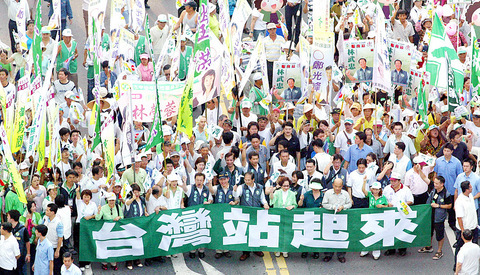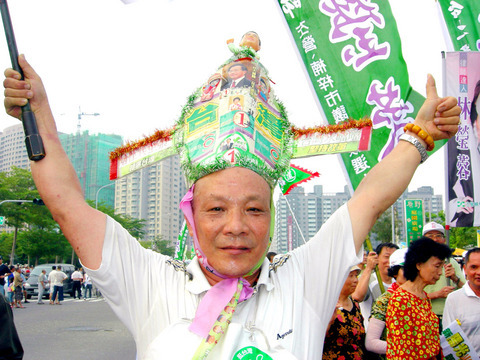At a rally in Kaohsiung yesterday celebrating the Democratic Progressive Party's (DPP) 20th birthday, President Chen Shui-bian (陳水扁) said that the DPP could continue as the governing party after the 2008 presidential election as long as it had faith in itself.
Chen, listing the party's "birthday wishes" to a gathering of high-spirited DPP supporters in Kaohsiung last night, said the DPP would win the year-end Taipei and Kaohsiung mayoral elections and that the party would win a majority in the legislative election next year.
"If we take a good, hard look at ourselves, correct our mistakes, uphold our integrity, do the right thing and move in the right direction then the DPP will have faith in itself and will be successful [in retaining office]," he said.

PHOTO: CNA
Government exists for the sake of the public, Chen said, adding that his administration would do its best to increase investment in local industry, develop job opportunities and bridge the gap between rich and poor.
Chen said the government would work to deliver a new constitution that "responds to the current situation," join the UN under the name "Taiwan" and hold a referendum calling for the recovery of the Chinese Nationalist Party's (KMT) stolen assets.
The DPP's most senior officials, including Vice President Annette Lu (

PHOTO: CNA
Referring to the government's achievements, Su said that many DPP supporters might not be satisfied with what the party has achieved over the past few years, and that the DPP would review its approach.
Leading the crowd in a thumbs-up gesture -- in response to the thumbs-down gesture of former DPP chairman Shih Ming-teh's (
Yu said the party would aim for Taiwan to become a "normal country" within 10 years.
Denying "pro-China media" charges that he deliberately stoked ethnic conflict, Yu said that he would not subscribe to, read or buy advertisements in the Chinese-language China Times as long as he was in office.
Yu also called on the party faithful to stand behind the president because "he stands for the nation and did not commit any crime."
Acting Kaohsiung City Mayor Yeh Chu-lan (葉菊蘭) told the rally that the party had fought for democracy and freedom. She said the party would not forget the core values upon which it was founded.
Earlier in the afternoon pro-DPP activists had marched through the city shouting"Long Live Taiwan!" and other slogans, with Lu and Su riding in a vehicle among them and beating drums.
Like many marchers, Lu was wearing green, the party's color.
About a dozen people carried a massive cloth banner with the slogan "Stand Up, Taiwan" written across it, while colored balloons floated overhead.
Yu gave a double thumbs-up as a sign of support for Chen, who didn't take part in the march but was scheduled to speak later at the rally.
The president's son, Chen Chih-chung (
A 36-year-old man surnamed Jang said that he and his mother had traveled to Kaohsiung from Taichung the previous night to make up for an event he missed on Sept. 16 when the Taiwan Society staged a large rally in Taipei.
`Stolen assets'
A supporter of the DPP since it was in opposition, Jang displayed posters written in Chinese and English to "help the foreign media understand that the KMT needs to return its stolen assets."
National Cheng Kung University Professor Chen Shean-jen (
Organizers said 350,000 people took part in the march, but an initial police estimate put the crowd at 105,000.
Kaohsiung police said that more than 2,700 officers were standing by, while 200 barbed-wire barricades had been erected.

AIR SUPPORT: The Ministry of National Defense thanked the US for the delivery, adding that it was an indicator of the White House’s commitment to the Taiwan Relations Act Deputy Minister of National Defense Po Horng-huei (柏鴻輝) and Representative to the US Alexander Yui on Friday attended a delivery ceremony for the first of Taiwan’s long-awaited 66 F-16C/D Block 70 jets at a Lockheed Martin Corp factory in Greenville, South Carolina. “We are so proud to be the global home of the F-16 and to support Taiwan’s air defense capabilities,” US Representative William Timmons wrote on X, alongside a photograph of Taiwanese and US officials at the event. The F-16C/D Block 70 jets Taiwan ordered have the same capabilities as aircraft that had been upgraded to F-16Vs. The batch of Lockheed Martin

GRIDLOCK: The National Fire Agency’s Special Search and Rescue team is on standby to travel to the countries to help out with the rescue effort A powerful earthquake rocked Myanmar and neighboring Thailand yesterday, killing at least three people in Bangkok and burying dozens when a high-rise building under construction collapsed. Footage shared on social media from Myanmar’s second-largest city showed widespread destruction, raising fears that many were trapped under the rubble or killed. The magnitude 7.7 earthquake, with an epicenter near Mandalay in Myanmar, struck at midday and was followed by a strong magnitude 6.4 aftershock. The extent of death, injury and destruction — especially in Myanmar, which is embroiled in a civil war and where information is tightly controlled at the best of times —

China's military today said it began joint army, navy and rocket force exercises around Taiwan to "serve as a stern warning and powerful deterrent against Taiwanese independence," calling President William Lai (賴清德) a "parasite." The exercises come after Lai called Beijing a "foreign hostile force" last month. More than 10 Chinese military ships approached close to Taiwan's 24 nautical mile (44.4km) contiguous zone this morning and Taiwan sent its own warships to respond, two senior Taiwanese officials said. Taiwan has not yet detected any live fire by the Chinese military so far, one of the officials said. The drills took place after US Secretary

THUGGISH BEHAVIOR: Encouraging people to report independence supporters is another intimidation tactic that threatens cross-strait peace, the state department said China setting up an online system for reporting “Taiwanese independence” advocates is an “irresponsible and reprehensible” act, a US government spokesperson said on Friday. “China’s call for private individuals to report on alleged ‘persecution or suppression’ by supposed ‘Taiwan independence henchmen and accomplices’ is irresponsible and reprehensible,” an unnamed US Department of State spokesperson told the Central News Agency in an e-mail. The move is part of Beijing’s “intimidation campaign” against Taiwan and its supporters, and is “threatening free speech around the world, destabilizing the Indo-Pacific region, and deliberately eroding the cross-strait status quo,” the spokesperson said. The Chinese Communist Party’s “threats